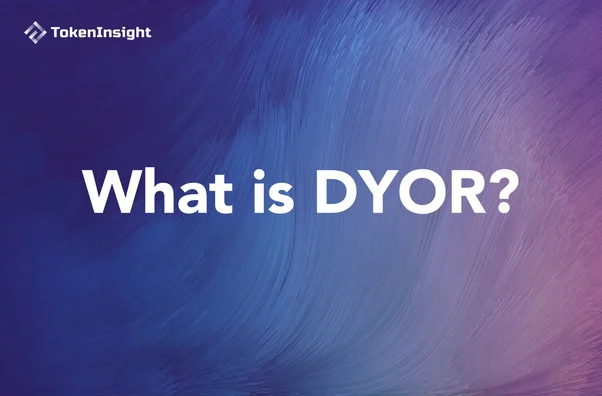What Does DYOR Stand For?
DYOR stands for “do your own research.”
This phrase is common among analysts, investors, and crypto enthusiasts. It’s often combined with the abbreviation NFA (not financial advice). Together, they act as a reminder: you are responsible for your financial decisions.
Why Is DYOR Important?
In the volatile crypto market, DYOR serves two key purposes:
- Promoting Personal Responsibility
Relying on random advice can lead to losses. DYOR encourages independent thinking and informed decisions. - Providing Legal Protection
In some countries, investment advice without disclaimers can result in lawsuits. For example:- If someone offers financial advice that causes losses, they may face legal action.
- Even informal advice (e.g., on social media) can create liabilities.
Using phrases like DYOR and NFA helps creators and influencers avoid being mistaken for licensed advisors. These terms clearly state that the content is not official financial advice.
How to DYOR Effectively
Doing your own research might seem daunting, but it becomes easier with a structured approach. Here’s how:
1. Set a Goal
Define what you want to learn. Are you evaluating a coin, avoiding scams, or deciding on an investment?
Examples of goals:
- Detect fraudulent projects.
- Understand token utility.
- Assess project sustainability.
2. Gather Relevant Data
Depending on your objective, you may collect data through traditional or blockchain-specific methods.
- a) Traditional Finance (TradFi)
Regulated industries provide detailed and reliable data. Key sources include:
- Financial statements (e.g., balance sheets).
- Ownership records.
- Regulatory filings.
- Risk assessments.
Tools for TradFi Research:
- OpenCorporates: A database with over 220 million company records.
- b) Web3 and Blockchain Tools
Crypto and blockchain projects emphasize transparency. Use tools like block explorers to uncover real-time data.
Popular Blockchain Tools:
|
Tool |
Features |
Use Case |
|
Etherscan |
Wallet data, gas fees, token info |
Ethereum network analysis |
|
Tenderly |
Transaction details, simulations |
Debugging and advanced analytics |
|
Phalcon |
Trace transactions, unique users |
Security and on-chain data |
3. Filter the Data
Focus on data that supports your goal. Avoid irrelevant information that distracts from your analysis.
Useful Metrics for Research
Different metrics are valuable depending on your topic. Commonly analyzed data includes:
- Market Capitalization: Overall value of a cryptocurrency.
- Trading Volume: Activity levels over time.
- Supply Cap: Maximum token supply.
- Utilization Rate: How a token is used in applications.
- Interest Rates: For staking or lending protocols.
Tip: Always compare Fully Diluted Valuation (FDV) with market capitalization. FDV can provide deeper insights.
Always DYOR
DYOR is more than a phrase—it’s a philosophy for smart investing. By doing your research, you:
- Take control of financial decisions.
- Avoid falling victim to scams.
- Reduce dependence on influencers or biased opinions.
Crypto is unpredictable. Always verify the information you rely on. While DYOR is crucial, consulting financial professionals can also help. Stay informed and stay safe in the dynamic world of cryptocurrency.






